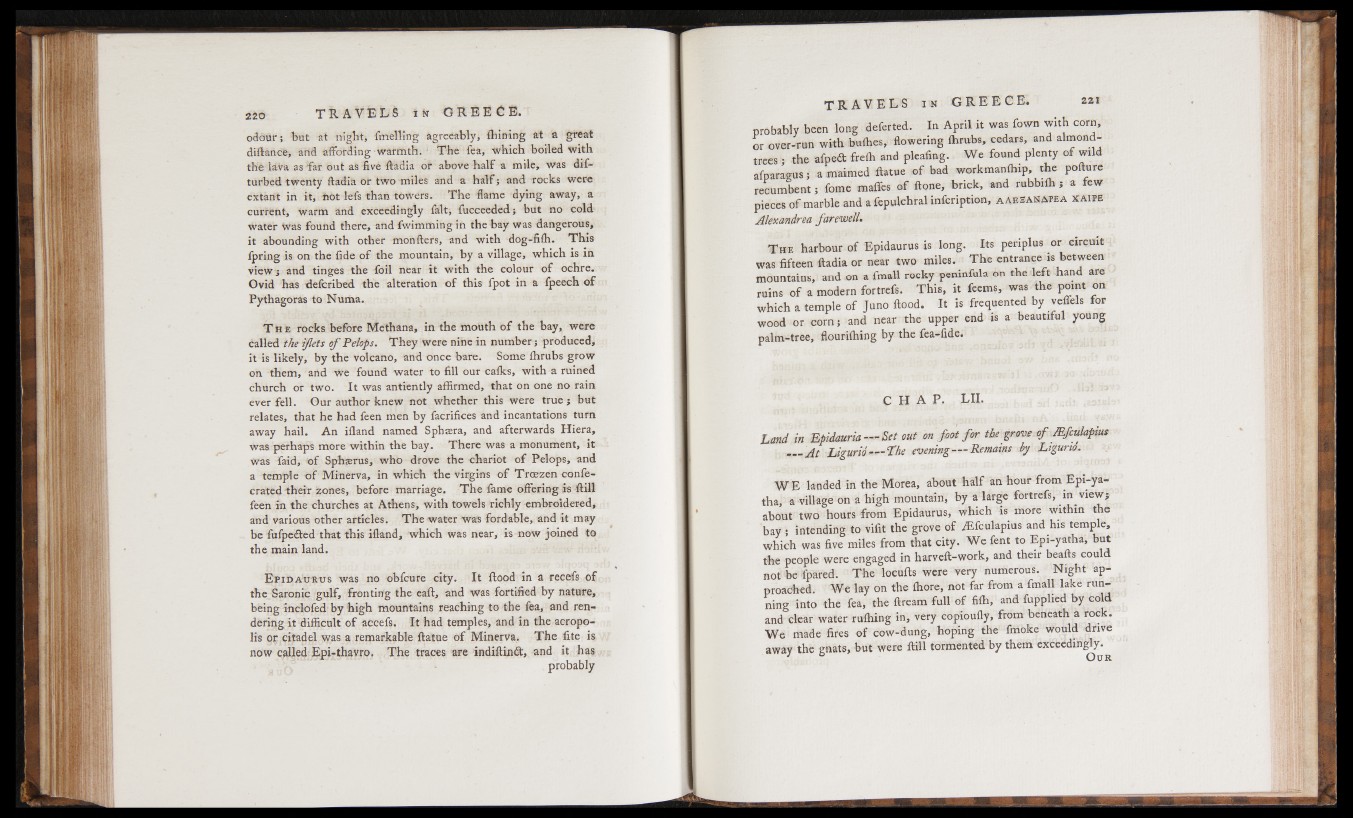
220 T R A V E L S in G R E E C E .
odddr; tmt at night* fmelling Agreeatityi ChMng at a great
diflancb* aitfl affbtding-warmth,i The fea, Which bbHed with
the lava as-Iar $ut a& -five ffaclia of above'half a mile, was dif-
turbed twenty fta&ia bt two -miles and -a half ; and -rocks wore
extant in it,-hot lefe than towers. The flame dying away, a
current, Warm and exceedingly fffltj fucceededj but no cold-
water Was found there, and fwimmirtg in the-bay was dangerous*
it abounding with other fnonftefs, and with dog-fifh. This
fpring is on the fide of A e mountain, by a village, which is in
view 3 and tinges the foil near it with the colour o f ochre.
Ovid has described the alteration of this- fpot in a fpeeeh of
Pythagoras to Numa.
T he rocks before Methana, in the motith o f the bay, were
czW tdikeifets o f Peiops. They were nine in number j produced*
it ds likely, by the volcano, and Once hare. Some fhrtibs grow
oh them, a Ad We found water to fill our caffes, with a ruined
church or two. It was antiently affirmed, that on one no rain
ever fell. Gur author knew not whether this were true 5 but
relates, that he had feen men by facrifices and incantations turn
away hail. An ifland named Sphaera, and afterwards Hiera,
Was perhaps mere within the bay. There was a monument, it
Was faid, o f Spbaerus, who drove the chariot o f Peiops, and
a temple Of Miftefva, in which the virgins o f Treezen oonfe-
crafed their Zones, before marriage. The tame offering is Rill
feen m the churches at Athens, with towels richly embroidered,
atad various Other articles. The water was fordable, and it may
be fofpe&ed that this ifland, which was near, is now joined *0
the main land.
E'p id A tm o s was no obfcure city. It flood in a ceceffs of
the Saronic gulf, fronting the eaft, and was fortified by nature,
being inclofed by high mountains reaching to the fea* and rendering
it difficult of accefs. It had temples, and in the acropolis
9$ citadel was a remarkable flattie of Minerva. The file is
now called Epi-thavro. The traces are indiftindt, and it has
, probably
probably been long d en ted . In>Ap|iiut was fown with « m f
or overrun with buffies, flowering fhrubs, cedars, and almond-
trees j the afpeft freffi and pleating. We found plenty of wild
afparagus j a maimed ffatue <©f bad workmanffiip, the poihire
recumbent 5 feme maffes of Aon®, brick, *nd rubbifo j a few
pieces d f marble andafepniehral infcription, a Aesasapea x a ip E
Alexandrea farewell.
T h-e harbour of Epidaums is long. Its peripks or dreuit
was fifteen tiadia or near two miles. 1 The entr aneetis between
mountains, and on a fmall rocky penintitiaon th e fe ft band are
ruins o f a modern fortrefs. This, it feems, was 4hb fm m on
which a temple of Juno flood. It Is frequented by vefiels for
wood or ^orn $ and near nte upper end-is a beauttfol yodng
palm-tree, flourifhing byrthe fea-fide.
c H A P, m .
Land in B p iia u ria -~ & t m d n f a t fw
— A t ,Ligurio— $he evening Remam i # £ P p a » P
W E landed in the Morea, about h ^ f an bout from Epl-yd“
tha, a village oh-a high mountain, by a large fortrefs; in view*
about two hours from Epidaurus, which % nfore :within the
‘bay 5 intending to vifit the grove of jEfculapius and his temple,
which was five miles from that city. We font to Epi-yatha* but
the people were engaged in harveft-work, and their beafts emild
aot'be Ipared. The loeufts were very numerous. Night approached.
W-e lay bn the flibre, *t6t-ff*r *bta‘
ning into the fea, the ftream fuR o f
and clear water ruffling in, very eopioufly, from beneath ¥obk.
We made fires of cbw-dung, hoping the friibke Would drive
away the gnats, -but were ffffi tormented by therir exife&lfogfy.